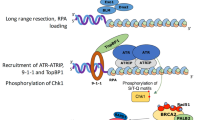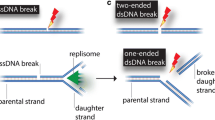Abstract
53BP1 is a very well-known protein that is recruited to DNA lesions. The focal accumulation of p53 binding protein, 53BP1, is a main feature indicating the repair of spontaneous or irradiation-induced foci (IRIF). Thus, here, we addressed the question of whether mutations in the TP53 gene, which often affect the level of p53 protein, can change the recruitment of 53BP1 to γ- or UVA-irradiated chromatin. In various TP53 mutants, we observed a distinct accumulation of 53BP1 protein to UV-induced DNA lesions: in R273C mutants, 53BP1 appeared transiently at DNA lesions, during 10–30 min after irradiation; the mutation R282W was responsible for accumulation of 53BP1 immediately after UVA-damage; and in L194F mutants, the first appearance of 53BP1 protein at the lesions occurred during 60–70 min. These results showed that specific mutations in the TP53 gene stand behind not only different levels of p53 protein, but also affect the localized kinetics of 53BP1 protein in UVA-damaged chromatin. However, after γ-irradiation, only G245S mutation in TP53 gene was associated with surprisingly decreased level of 53BP1 protein. In other mutant cell lines, levels of 53BP1 were not affected by γ-rays. To these effects, we conversely found a distinct number of 53BP1-positive irradiation-induced foci in various TP53 mutants. The R280K, G245S, L194F mutations, or TP53 deletion were also characterized by radiation-induced depletion in MDC1 protein. Moreover, in mutant cells, an interaction between MDC1 and 53BP1 proteins was abrogated when compared with wild-type counterpart. Together, the kinetics of 53BP1 accumulation at UV-induced DNA lesions is different in various TP53 mutant cells. After γ-irradiation, despite changes in a number and a volume of 53BP1-positive foci, levels of 53BP1 protein were relatively stable. Here, we showed a link between the status of MDC1 protein and TP53 gene, which specific mutations caused radiation-induced MDC1 down-regulation. This observation is significant, especially with regard to radiotherapy of tumors with abrogated function of TP53 gene.








Similar content being viewed by others
References
Bártová E, Kozubek S, Kozubek M et al (2000) Nuclear topography of the c-myc gene in human leukemic cells. Gene 244:1–11
Bártová E, Harnicarová A, Pacherník J, Kozubek S (2005) Nuclear topography and expression of the BCR/ABL fusion gene and its protein level influenced by cell differentiation and RNA interference. Leuk Res 29:901–913. doi:10.1016/j.leukres.2005.01.011
Bassing CH, Suh H, Ferguson DO et al (2003) Histone H2AX: a dosage-dependent suppressor of oncogenic translocations and tumors. Cell 114:359–370. doi:10.1016/S0092-8674(03)00566-X
Bekker-Jensen S, Lukas C, Melander F et al (2005) Dynamic assembly and sustained retention of 53BP1 at the sites of DNA damage are controlled by Mdc1/NFBD1. J Cell Biol 170:201–211. doi:10.1083/jcb.200503043
Caspari T (2000) Checkpoints: how to activate p53. Curr Biol 10:315–317
Celeste A, Difilippantonio S, Difilippantonio MJ et al (2003) H2AX haploinsufficiency modifies genomic stability and tumor susceptibility. Cell 114:371–383
Cho Y, Gorina S, Jeffrey PD, Pavletich NP (1994) Crystal structure of a p53 tumor suppressor-DNA complex: understanding tumorigenic mutations. Science 265:346–355
Cuella-Martin R, Oliveira C, Lockstone HE, Snellenberg S, Grolmusova N, Chapman JR (2016) 53BP1 integrates DNA repair and p53-dependent cell fate decisions via distinct mechanisms. Mol Cell 64:51–64. doi:10.1016/j.molcel.2016.08.002
Derbyshire DJ, Basu BP, Serpell LC et al (2002) Crystal structure of human 53BP1 BRCT domains bound to p53 tumour suppressor. EMBO J 21:3863–3872. doi:10.1093/emboj/cdf383
Durland-Busbice S, Reisman D (2002) Lack of p53 expression in human myeloid leukemias is not due to mutations in transcriptional regulatory regions of the gene. Leukemia 16:2165–2167. doi:10.1038/sj.leu.2402647
England B, Huang T, Karsy M (2013) Current understanding of the role and targeting of tumor suppressor p53 in glioblastoma multiforme. Tumor Biol 34:2063–2074. doi:10.1007/s13277-013-0871-3
Fernandez-Capetillo O, Chen H-T, Celeste A et al (2002) DNA damage-induced G2-M checkpoint activation by histone H2AX and 53BP1. Nat Cell Biol 4:993–997. doi:10.1038/ncb884
Foltánková V, Matula P, Sorokin D et al (2013) Hybrid detectors improved time-lapse confocal microscopy of PML and 53BP1 nuclear body colocalization in DNA lesions. Microsc Microanal 19:360–369. doi:10.1017/S1431927612014353
Goldberg M, Stucki M, Falck J et al (2003) MDC1 is required for the intra-S-phase DNA damage checkpoint. Nature 421:952–956. doi:10.1038/nature01445
Hollstein M, Rice K, Greenblatt T et al (1994) Database of p53 gene somatic mutations in human tumors and cell lines. Nucl Acids Res 22:3551–3555
Iwabuchi K, Bartel PL, Li B et al (1994) Two cellular proteins that bind to wild-type but not mutant p53. Proc Natl Acad Sci USA 91:6098–6102
Joerger AC, Fersht AR (2007) Structure-function-rescue: the diverse nature of common p53 cancer mutants. Oncogene 26:2226–2242. doi:10.1038/sj.onc.1210291
Joerger AC, Ang HC, Veprintsev DB et al (2005) Structures of p53 cancer mutants and mechanism of rescue by second-site suppressor mutations. J Biol Chem 280:16030–16037. doi:10.1074/jbc.M500179200
Joo WS, Jeffrey PD, Cantor SB et al (2002) Structure of the 53BP1 BRCT region bound to p53 and its comparison to the Brca1 BRCT structure. Genes Dev 16:583–593. doi:10.1101/gad.959202
Kachirskaia I, Shi X, Yamaguchi H et al (2008) Role for 53BP1 tudor domain recognition of p53 dimethylated at lysine 382 in DNA damage signaling. J Biol Chem 283:34660–34666. doi:10.1074/jbc.M806020200
Khanna KK, Jackson SP (2001) DNA double-strand breaks: signaling, repair and the cancer connection. Nat Genet 27:247–254. doi:10.1038/85798
Kitayner M, Rozenberg H, Kessler N et al (2006) Structural basis of DNA recognition by p53 tetramers. Mol Cell 22:741–753. doi:10.1016/j.molcel.2006.05.015
Koeffler HP, Miller C, Nicolsont MA et al (1986) Increased expression of p53 protein in human leukemia cells. Proc Natl Acad Sci USA 83(11):4035–4039
Krejčí J, Harničarová A, Kůrová J et al (2008) Nuclear organization of PML bodies in leukaemic and multiple myeloma cells. Leuk Res 32:1866–1877. doi:10.1016/j.leukres.2008.04.021
Legartová S, Jugová A, Stixová L et al (2013) Epigenetic aspects of HP1 exchange kinetics in apoptotic chromatin. Biochimie 95:167–179. doi:10.1016/j.biochi.2012.09.027
Liu J, Pan Y, Ma B, Nussinov R (2006) “Similarity trap” in protein-protein interactions could be carcinogenic: simulations of p53 core domain complexed with 53BP1 and BRCA1 BRCT domains. Structure 14:1811–1821. doi:10.1016/j.str.2006.10.009
Loughery J, Meek D (2013) Switching on p53: an essential role for protein phosphorylation? Biodiscovery. doi:10.7750/BioDiscovery.2013.8.1
Luijsterburg MS, Dinant C, Lans H et al (2009) Heterochromatin protein 1 is recruited to various types of DNA damage. J Cell Biol 185:577–586. doi:10.1083/jcb.200810035
Mariotti LG, Pirovano G, Savage KI, Ghita M, Ottolenghi A, Prise KM, Schettino G (2013) Use of the γ-H2AX assay to investigate DNA repair dynamics following multiple radiation exposures. PLoS One 8(11):e79541. doi:10.1371/journal.pone.0079541
Misteli T, Soutoglou E (2009) The emerging role of nuclear architecture in DNA repair and genome maintenance. Nat Rev Mol Cell Biol 10:243–254. doi:10.1038/nrm2651
Mochan TA, Venere M, DiTullio RA, Halazonetis TD (2003) 53BP1 and NFBD1/MDC1-Nbs1 function in parallel interacting pathways activating ataxia-telangiectasia mutated (ATM) in response to DNA damage. Cancer Res 63:8586–8591. doi:10.1038/nrc1011
Mochan TA, Venere M, Ditullio RA, Halazonetis TD (2004) 53BP1, an activator of ATM in response to DNA damage. DNA Repair (Amst) 3:945–952. doi:10.1016/j.dnarep.2004.03.017
Mok MTS, Henderson BR (2012) The in vivo dynamic interplay of MDC1 and 53BP1 at DNA damage-induced nuclear foci. Int J Biochem Cell Biol 44:1398–1409. doi:10.1016/j.biocel.2012.05.025
Morales JC, Franco S, Murphy MM et al (2006) 53BP1 and p53 synergize to suppress genomic instability and lymphomagenesis. Proc Natl Acad Sci USA 103:3310–3315. doi:10.1073/pnas.0511259103
Nuaaman MM, Samuel Benchimol (2013) Proteasome-independent p53 degradation. Cell Res 23:597–598. doi:10.1038/cr.2013.38
Ozaki T, Nagase T, Ichimiya S et al (2000) NFBD1/KIAA0170 is a novel nuclear transcriptional transactivator with BRCT domain. DNA Cell Biol 19:475–485. doi:10.1089/10445490050128403
Panier S, Boulton SJ (2014) Double-strand break repair: 53BP1 comes into focus. Nat Rev Mol Cell Biol 15:7–18. doi:10.1038/nrm3719
Schultz LB, Chehab NH, Malikzay A, Halazonetis TD (2000) p53 binding protein 1 (53BP1) is an early participant in the cellular response to DNA double-strand breaks. J Cell Biol 151:1381–1390
Sillen A, Engelborghs Y (1998) The correct use of “average” fluorescence parameters. Photochem Photobiol 67:475–486
Soussi T, Caron de Fromentel C, May P (1990) Structural aspects of the p53 protein in relation to gene evolution. Oncogene 5:945–952
Stewart GS, Wang B, Bignell CR et al (2003) MDC1 is a mediator of the mammalian DNA damage checkpoint. Nature 421:961–966. doi:10.1038/nature01446
Stixová L, Sehnalová P, Legartová S, et al (2014) HP1β-dependent recruitment of UBF1 to irradiated chromatin occurs simultaneously with CPDs. Epigenetics Chromatin 7:39. doi:10.1186/1756-8935-7-39
Stucki M, Jackson SP (2004) MDC1/NFBD1: a key regulator of the DNA damage response in higher eukaryotes. DNA Repair (Amst) 3:953–957. doi:10.1016/j.dnarep.2004.03.007
Suchánková J, Kozubek S, Legartová S et al (2015) Distinct kinetics of DNA repair protein accumulation at DNA lesions and cell cycle-dependent formation of γH2AX- and NBS1-positive repair foci. Biol Cell 0:1–15. doi:10.1111/boc.201500050
Sugimoto K, Toyoshima H, Sakai R et al (1992) Frequent mutations in the p53 gene in human myeloid leukemia cell lines. Blood 79:2378–2383
Šustáčková G, Kozubek S, Stixová L et al (2012) Acetylation-dependent nuclear arrangement and recruitment of BMI1 protein to UV-damaged chromatin. J Cell Physiol 227:1838–1850. doi:10.1002/jcp.22912
Ward IM, Minn K, Jorda KG, Chen J (2003) Accumulation of checkpoint protein 53BP1 at DNA breaks involves its binding to phosphorylated histone H2AX. J Biol Chem 278:19579–19582. doi:10.1074/jbc.C300117200
Wolf D, Rotter V (1984) Inactivation of p53 gene expression by an insertion of Moloney murine leukemia virus-like DNA sequences. Mol Cell Biol 4:1402–1410
Wolf D, Rotter V (1985) Major deletions in the gene encoding the p53 tumor antigen cause lack of p53 expression in HL-60 cells. Cell Biol 82:790–794
Author contributions
JS was responsible for immunofluorescence, local micro-irradiation, western blotting, and image analyses. SL generated the western blotting results, and she performed the quantification of western blot fragments with the ImageJ software. ER and BV provided TP53 mutants and completed the genotyping. SK was responsible for the infrastructure supporting the experiments and provided critical review of the text. EB coordinated the experimental effort, is responsible for the final version of all images, and wrote this paper. All authors read and approved the final version of this manuscript.
Author information
Authors and Affiliations
Corresponding author
Ethics declarations
Funding
This work was supported by the Czech Science Foundation; grant number: P302/12/G157. The research of Soňa Legartová leading to these results was also supported by funding from the Norwegian Financial Mechanism 2009–2014 under Project Contract no. 7F14369.
Conflict of interest
The authors have declared no conflicts of interest.
Rights and permissions
About this article
Cite this article
Suchánková, J., Legartová, S., Ručková, E. et al. Mutations in the TP53 gene affected recruitment of 53BP1 protein to DNA lesions, but level of 53BP1 was stable after γ-irradiation that depleted MDC1 protein in specific TP53 mutants. Histochem Cell Biol 148, 239–255 (2017). https://doi.org/10.1007/s00418-017-1567-3
Accepted:
Published:
Issue Date:
DOI: https://doi.org/10.1007/s00418-017-1567-3




